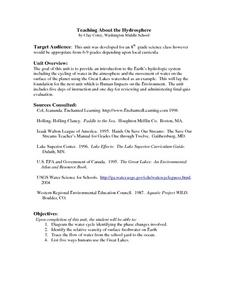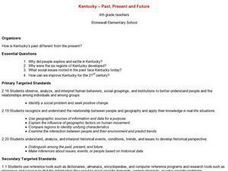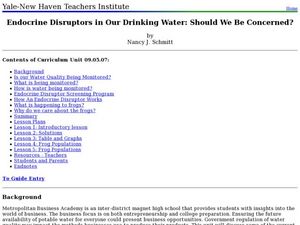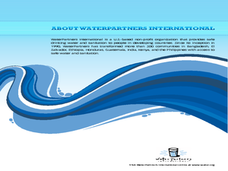Curated OER
The Population Explosion: Causes and Consequences
Students use this lesson to focus on population growth and the threat of overpopulation. In groups, they analyze the world birth and death rates to determine the growth rate of the population. As a class, they discuss the causes and...
Curated OER
Studying Birds in the Field
This is a well-designed science activity which helps students learn the behavior of different species of birds. Working with partners and in small team, students learn to scientifically observe birds.
Curated OER
Watershed Lesson Plan
Students are introduced to the concepts of a watershed, stream flow and water quality. This five-day plan is an excellent way to introduce students to the concepts involved. They create their own watershed using a paper bag, water and...
Curated OER
Teaching About the Hydrosphere
Eighth graders are introduced to the Earth's hydrologic system including the cycling of water in the atmosphere and the movement of water on the surface of the planet using the Great Lakes watershed as an example.
Curated OER
Exercise and Water
Second graders discover the needs of their body by trying different types of aerobic exercise. In this physical education lesson plan, 2nd graders analyze The Busy Body Book by glancing at the pictures inside and predicting what the...
Curated OER
fun with Plants that We Use
Students become familiar with the products made from various plants. In this plants lesson, students experiment with natural dyes from plants. Students complete a list of things made from plants. Students answer questions about plant...
Curated OER
Models as Tools for Ecosystem Management
Fifth graders explore the concept of environmental management. For this ecosystem lesson, 5th graders discover how models help scientists learn more about managing ecosystems. Students create their own model, make observations and...
Curated OER
Biological Sciences
Students examine biodiversity and interrelatedness concepts. In this ecology lesson students go on a field trip and fill out a data sheet.
Curated OER
After the Garbage Can: Where Does Our Trash Go?
Learners explore how waste disposal has changed over time and what the current issues are. In this disposal instructional activity students collect data and create graphs.
Curated OER
Sibling Relationships in the Animal World
Young scholars research sibling relationships in the animal world. In this animal science lesson plan, students read the book, Sisters and Brothers: Sibling Relationships in the Animal World and discuss the sibling relationships. Young...
Curated OER
Comparison of hometown life with that of life in a Canadian city
Students research cultural characteristics of a Canadian city with that of their home town. They complete a map handout, providing the relative location on a large map and the absolute location on a provincial map. Students work together...
Curated OER
"Garden Springs Gardeners"
First graders ponder the question of how plants help their lives. They observe and compare properties of several different plants. Differentiate between living organisms and nonliving objects.
Curated OER
Needs of Living Things
Students discuss and explore the needs of living things. They choose to create a slide show with captions, create a web showing the needs of one Organism using KidPix. or make picture book by hand or using Microsoft Publisher.
Curated OER
Testing Your Water
Students perform several water quality tests on groundwater from their area. They use test strips to determine the pH, hardness, alkalinity, nitrates, iron and chloride levels.
Curated OER
Homeless in our Community
Third graders explore homelessness in their local community. In this service project/social studies lessons, children research local areas where homeless people reside, discuss global acceptance and unity, and visit a local food bank.
Curated OER
Regional Landforms and Native People
Third graders study the Native American tribes of Maidu and Miwok by studying Internet artifacts, culture, language, music, storytelling, architecture, food, clothing, crafts and geology.
Curated OER
Kentucky: Past, Present and Future
Fourth graders analyze how Kentucky's past is different from the present. They research why Kentucky was even explored and settles. What social issues face Kentucky now. Discussion lies on how Kentucky can be improved for the 21st century.
Curated OER
Endocrine Disruptors in Our Drinking Water: Should We Be Concerned?
Young scholars investigate the different hormone contaminants in the water supply. In this math lesson, students analyze data tables and graphs. They demonstrate exponential growth and decay using frog populations.
Curated OER
Old Solutions - New Solutions
Students examine descriptions of a mining company's land-reclamation project. They share information to analyze the environmental impact of the project. Independently, they answer questions on environmental and economic issues...
Curated OER
Walking For Water
Young scholars investigate how third world countries get their water. In this water instructional activity, students research how countries like Kenya and Ethiopia get their water supply. Young scholars participate in an experiment to...
Curated OER
Climate Change: Is there a Controversy
Students explore climate changes. For this climate changes lesson, students research what causes changes. Students search the Internet, summarize reports they find and create a poster with the information.
Curated OER
Flambe Elements
Eighth graders discuss atoms and electrons as well as atoic structure. They view atomic structure via the computer. Students watch a demonstration in which the teacher demonstrates glass tubing turning yellow in a Bunsen Burner flame....
Curated OER
The Conquest of the Aztec Civilization
Young scholars use the classroom atlases, the Internet or textbooks to draw a freehand map. They work in groups using the maps in the book The Broken Spears (Portilla) and The Conquest of New Spain (Diaz) to draw a freehand map...
Curated OER
Social Studies" Turning Points
Students will understand how people are affected by places and events and will communicate their opinions in an essay including historical facts.

























